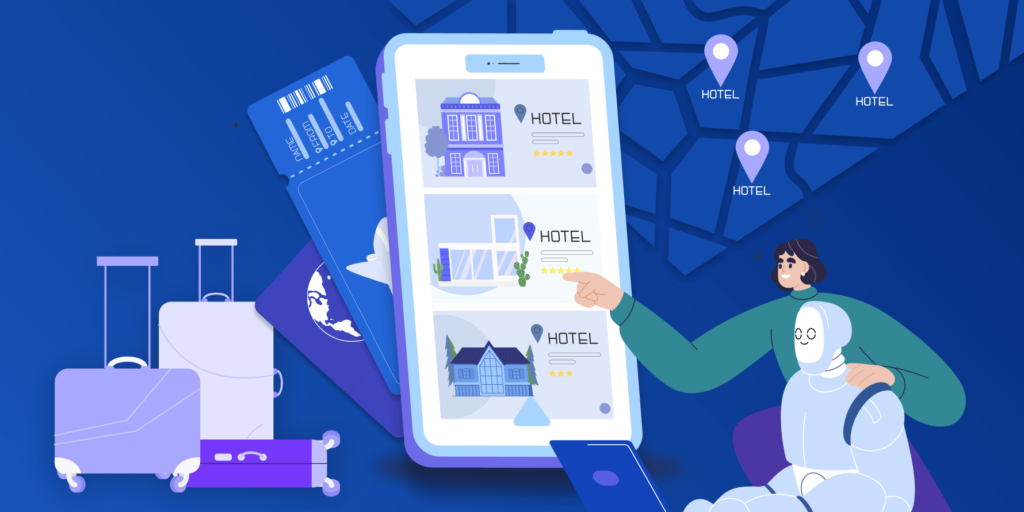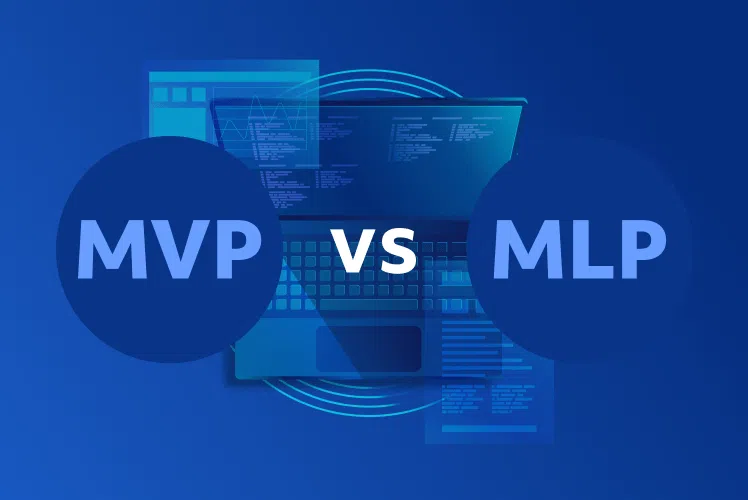Table of Contents
The hospitality industry has seen many changes in recent years, and most of them were caused by the COVID-19 pandemic. However, the hospitality industry keeps growing in a steady manner and, according to Statista, the global hospitality market is projected to reach $5.8 trillion in 2027.
Considering this growth and the fact that tourism is getting back on track, hotel owners might want to revamp their legacy software solutions and adopt innovation and automation. In this article, we’ll talk about the main hospitality technology trends that the industry witnesses now and will experience in the near future.

What is hospitality technology?
Hospitality technology can be defined as software used in the hospitality industry with an aim to improve client satisfaction and accelerate operations on all levels of a hotel . Whether it is a full-fledged solution covering all hospitality aspects or a specialized F&B system, it all falls under the hotel technology definition.
Businesses have been using hospitality technology for a long time, but the old systems are usually too complex, cumbersome, and hard to integrate with newer solutions. Because of that, more and more hotel owners adopt new technology for hotels that not only facilitate the processes but add intelligence and automation by using such technologies as RPA or AI.
The ultimate benefits of technology trends in hospitality industry
Implementation of new software solutions brings immense benefits both to hotel owners and visitors. Among the biggest ones are:
- Elimination of paperwork and digitization of processes: with hotel technology, all processes and documents are stored in a digital format in one place and can be accessed by people from different departments.
- Advanced analytics: since specialized systems collect and store massive amounts of information on visitors, hotel owners can generate detailed reports on clients’ preferences, predict their future behavior, and better manage their room pricing, adjusting it to the customer demand.
- Better personalization and user experience: with the rise of mobile, contactless check-ins, and AI-powered bots, hotels can now deliver superior user experience and provide better personalization.
- Increased revenue: as a result of all previously described activities, hotels can get rid of unnecessary spendings, accurately adjust pricing to the demand, and provide better services. All this ultimately leads to an increase in the revenue and better brand recognition.
Main types of hospitality software
An average hotel usually has several departments (front office, F&B, housekeeping, marketing, etc.) and every department manages a complex set of processes. So before discussing the hotel technology trends, let’s first understand what kind of systems are present and require renovation.
Property management system
A property management system is the core technology and a central hub of operations for any hotel. Previously, the PMS covered only the front office and was intended for helping with check-ins, reservations, and room assignments and billing. Today, a property management system includes other operations in addition to front office ones and remains an incredibly important business system. Note that PMSs vary in functionality, type, and size, so you have to choose the one that corresponds to your property type. For example, a complex Oracle Hospitality would be great for big chain hotels like Marriott while Cloudbeds would be a good choice for small, family-owned properties.
Food & Beverage (F&B) and MICE
Another important technology component for any hotel is F&B and MICE (Meeting, Incentives, Conferences and Exhibitions) software. This system automates and facilitates such operations as full restaurant management, room service, meetings intelligence, RFPs, and event management. And since there are hundreds of processes involved in smooth F&B and MICE management, it’s better to have a system designed specifically for these kinds of operations.
Revenue management
Revenue management covers a vast spectrum of operations and can include the following systems:
- Channel managers for linking a hotel with a booking engine;
- Central reservation systems for managing reservations;
- Market intelligence for learning about competitors and their proposals;
- Upselling software for personalized offers.
And these are not all tools that belong to the revenue management – the list is much bigger. But for the sake of clarity, we won’t go into too much detail here: just remember that revenue management helps hoteliers increase their revenue by constantly adjusting their pricing to the external environment and demand.
Marketing
Since hospitality is a highly competitive industry, hotels need to do their best to capture the guests’ interest and persuade them to book a room. Hence, hoteliers use a variety of specialized tools aimed at facilitating their marketing efforts and automating them. From direct booking tools to reputation management and customer feedback processing, these tools help hotels learn what guests want and provide them with relevant offers.
Key hotel technology trends to watch for
We’ve taken a look at the main types of hotel software – now let’s look at the latest technology trends in hospitality industry that are to dominate the industry and make the processes described above easier and more user-centric.
Contactless check-ins and check-outs
The adoption of contactless check-ins was heavily fueled by the pandemic, but even after its decline, the trend remained strong. Contactless check-in allows guests to independently check in a hotel and generate their room key without the need to stand in a line at a front desk or interact with hotel employees. The main advantages of this trend are speed of service and 24/7 availability: arriving guests can check in late at night or early in the morning, while the hotel won’t need to keep the front office staff at the desk all the time.
Artificial Intelligence and smart bots
Another powerful member of the technology trends in hospitality list is AI. The Artificial Intelligence technology is an invaluable assistant when it comes to automation, addition of intelligence, and optimization of workflows. In hotels, AI can help with the following functions:
- Analysis of the guests’ data and creation of accurate forecasts on future customer behavior and demand;
- Automation of mundane tasks (i.e., sending reminders to guests, monitoring room statuses);
- Addition of personalization to hotel services due to accurate analysis of each user’s profile.
And obviously, when talking about AI in hospitality, we can’t forget about smart chatbots. Being around for a while, chatbots have proved to be a great aid for any business due to multiple reasons. They are faster and more efficient than human employees (sorry!) and they provide more control to users over the services and information. Hence, if you hesitate about adopting a full-fledged AI solution, you can start small and implement a chatbot – and you’ll be both surprised and impressed at how it can affect customer experience and sales.
Robots and RPA
Even though robots are not so widespread as other technologies, they are steadily growing in popularity and taking over the hospitality industry. There are a few valid reasons for their success. First, robots still have this wow-effect, which, undoubtedly, results in better user experience and adds a competitive edge to a hotel. Second, robots are more efficient in performing certain tasks, which is a big advantage if you have a labor shortage or simply want to reduce your operating costs.
Examples of using robots in hospitality include:
- Robots that are used to greet guests and interact with them;
- Housekeeping robots that can perform certain functions and aid the housekeeping team;
- Robotic waiters and room service robots;
- Robots for luggage delivery.
And don’t forget about Robotic Process Automation (RPA) which means using robots for automating certain tasks. These tasks do not necessarily have to be big: even a smart bot falls under the RPA category. As RPA adepts say: anything can be automated. Thus, before implementing the technology, think carefully about your goals and objectives and what exact results you expect to achieve. Otherwise, you may find yourself adopting unnecessary automation which, in turn, will lead to extra spendings.
Mobile everything
According to Statista, there are approximately 7.33 billion mobile users worldwide, and the number is expected to reach 7.49 billion by 2025. Considering that mobile has become an all-in-one tool for handling our daily activities, businesses across the industries design their own apps to bring users closer and help them manage their operations. And obviously, this trend made its way into the hospitality industry and brought immense value both to hoteliers and guests.
First, there are mobile hotel applications that keep all your information in one place, allow easy reservation management, and reward the most loyal guests with incentives like discounts or special offers. Such apps are usually designed for a specific hotel brand (i.e. World of Hyatt) and are a great asset for frequent hotel visitors. There are also hotel booking apps that cover a specific region and allow you to virtually check in, contact the property, and create new bookings.
Second, there are mobile wallets and mobile ordering. Examples are scanning a QR code for the menu or paying with Apple Pay. An option to manage all payments and transactions with a smartphone is a real game changer as it not only saves time for users but increases revenue for properties.
Augmented reality and virtual reality
AR and VR technologies bring great value to many industries, especially to manufacturing and education. In hospitality, these technologies serve an educational and informative purpose and can help properties attract visitors and stand out.
Examples of how AR and VR can be used for hotels include:
- Virtual hotel and room tours: visitors can “experience” their stay beforehand and learn what the hotel has to offer;
- Interactive rooms: the principle is similar to using AR/VR in museums. With the help of special equipment, users can see and learn about the history of the hotel, see how it looked decades ago, and get information about items of interest.
- Gamification: everyone loves incentives, and hotels can use augmented and virtual reality to engage visitors and offer them games in exchange for prizes. These games can be purely educational or serve a promotional purpose – their type will depend on what exactly you need to achieve.
- Interactive training and education: lastly, AR and VR in hotels can be used for providing employee training and for educating guests on using certain amenities.
Sustainability
Sustainability may not be considered as a tech trend, but it’s definitely a big trend that more and more hotels over the world adopt. Since hotels are quite a big source of emissions, these properties began incorporating methods to minimize their carbon footprints. Some of the ways to do so are:
- Installation of on-site solar panels;
- Implementation of energy management systems;
- Use of energy-efficient lighting.
Technology trends in hotel industry such as the Internet of Things can help a lot here. By using smart sensors, hotel owners can always know about the rooms’ temperature and humidity levels, immediately react to any drastic changes, and overall incorporate smarter energy management based on the collected data.
In conclusion
The transition from legacy systems to new technology in hotels may sound too complex and challenging, and this is one of the reasons why some hotels prefer keeping things simple. However, the advantages of digital transformation are enormous and the implementation of hospitality technology trends is slowly becoming a must, not a need. In order for hotels to complete this transition smoothly, we recommend defining a clear list of business objectives and KPIs to achieve and to identity the main pain points that the technology is intended to solve. Only after listing down your goals and formulating what exactly you want to achieve, you will be able to create a solid implementation plan that will result in increased revenue and improved guest experience.


Comments